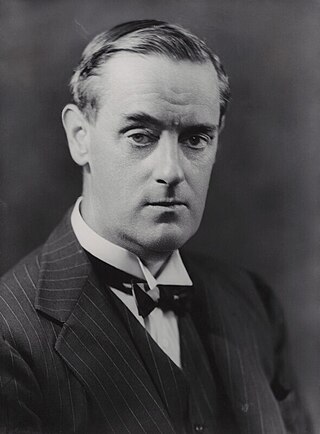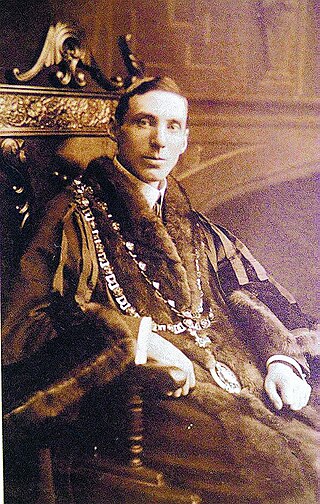
Victor Alexander John Hope, 2nd Marquess of Linlithgow, was a British Unionist politician, agriculturalist, and colonial administrator. He served as Governor-General and Viceroy of India from 1936 to 1943. He was usually referred to simply as Linlithgow.

Frederick A. YoungOBE, BSC was a British cinematographer. He is probably best known for his work on David Lean's films Lawrence of Arabia (1962), Doctor Zhivago (1965) and Ryan's Daughter (1970), all three of which won him Academy Awards for Best Cinematography. He was often credited as F. A. Young.

Arthur Oliver Villiers Russell, 2nd Baron Ampthill was a British peer, rower, and civil servant. He served as Governor of Madras from October 1900 to February 1906, and as acting Viceroy of India from April to December 1904.

Madras College, often referred to as Madras, is a Scottish comprehensive secondary school located in St Andrews, Fife. It educates over 1,400 pupils aged between 11 and 18 and was founded in 1833 by the Rev. Dr Andrew Bell.

Sivasailam Anantharamakrishnan, affectionately called "J" was an Indian industrialist and business tycoon who founded and led the Amalgamations Group of industries from 1945 to 1964.

Sir Charles Walter Starmer was a British newspaper proprietor and Liberal politician.
Sir Eric Charles Miéville was a senior British civil servant who served as Assistant Private Secretary to George VI from 1937 to 1945, and who also served as Private Secretary to several Governors-General of India and Canada.
Sir James Lawrence Hay was a New Zealand businessman, local politician and philanthropist.
Sir Clarmont Percival Skrine (1888–1974) was a British civil servant and administrator who served as the British consul-general in Kashgar from 1922 to 1924, Under-Secretary of State for India and agent for the Madras States from 1936 to 1939.
The 1945 New Year Honours were appointments by many of the Commonwealth realms of King George VI to various orders and honours to reward and highlight good works by citizens of those countries. They were announced on 1 January 1945 for the British Empire, Canada, and the Union of South Africa to celebrate the past year and mark the beginning of 1945.
The New Year Honours 1922 were appointments by King George V to various orders and honours to reward and highlight good works by members of the British Empire. They were published on 30 December 1921.

Anantharamakrishnan Sivasailam was an Indian industrialist, educationist, philanthropist and a former chairman and managing director of Amalgamations Group of Industries, a ₹ 70 billion conglomerate hosting a workforce of over 12,000. He headed the business family which was listed by Forbes as the 37th richest in India in 2015, with a net worth of US$ 2.5 billion. He was the president of the Society of Indian Automobile Manufacturers and ASSOCHAM and held the office of the Sheriff of Madras during 1969–1970. The Government of India awarded him the fourth highest civilian honour of the Padma Shri, in 2007, for his contributions to Indian industry.
The Sheriff of Madras was an apolitical titular position of authority bestowed for one year on a prominent citizen of Madras. The post was abolished in 1998.

Bernard Peter Atha was an English politician and actor. He served as Lord Mayor of Leeds and was a major figure in the arts and sport in West Yorkshire and elsewhere; he also appeared in a number of films.
John Wingett Davies was a British company director in the fields of ship broking, aviation, and films, whose main interest was as an exhibitor in the world of cinema.
Sir Archibald Richard Charles Southby, 2nd Baronet was an English first-class cricketer and British Army officer. Southby served in the Rifle Brigade from 1933 to 1948, seeing action in the Second World War, for which he was made an OBE and received the Medal of Freedom. He also played first-class cricket in British India for Madras and the Europeans, as well as appearing for the British Army cricket team. He succeeded his father as the 2nd Baronet of the Soutby Baronetcy in 1969, before being succeeded by his son upon his death in 1988.
The 13th annual Powerlist was judged by a panel chaired by Dame Linda Dobbs and published in October 2019; sponsored by J.P. Morgan & Co., pwc, linklaters and The Executive Leadership Council.
Lieutenant-general Sir Ernest William Charles Bradfield was an English first-class cricketer and British Army officer. Graduating from St Mary's Hospital Medical School, he joined the Indian Medical Service in 1903 and would serve in campaigns in the North-West Frontier Province of British India and in the Mesopotamian campaign of the First World War. He would go onto hold a number of senior appointments within the Indian Medical Service, rising to the rank of lieutenant-general. Bradfield was noted as being infleuential in the establishment of the Indian Army Medical Corps during the Second World War. In addition to his lengthy and decorated military career, Bradfield also played first-class cricket on four occasions for the Europeans cricket team in India.